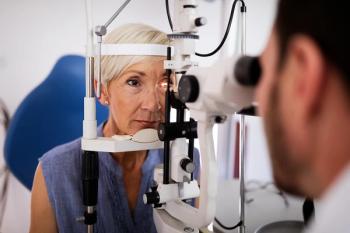
Improving quality of life in glaucoma patients
David Friedman, MD, says glaucoma has a major impact on a patient’s quality of life, but shared his tips for treating these concerns.
Atlanta-David Friedman, MD, says glaucoma has a major impact on a patient’s quality of life, but shared his tips for treating these concerns.
“The question that I ask myself every day when I’m taking care of patients is, ‘What am I doing here? Am I preventing patients from functional loss? Am I treating the eye pressue? Am I helping patients cope with changes in their lives’ And I think it’s a little bit of all of the above. But really, the ultimate goal of almost all eye care is to maintain quality of life,” says Dr. Friedman.
Assessing quality of life
One of the key problems with quality of life measures is that by the time glaucoma patients come in, they usually have very severe vision loss, he says, and adaptations occur with chronicity.
Related:
“Most patients who develop glaucoma develop it very slowly-over decades-and if you lose vision at that rate, you’re very unlikely to notice it. You don’t remember what your vision was like 10 minutes ago, no less 10 years ago,” he says.
There are certain aspects of vision you need to ask about when assessing quality of life in a glaucoma patient:
• Central and near vision
• Peripheral vision
• Dark adaptation and glare
• Personal care and household tasks
• Outdoor mobility
“It all depends on what you’re asking whether patients can report to you what’s going on,” he says. “If you look at mood or feeling like you’re a burden to others, that is a better predictor of your statements on a question about your vision than your visual acuity.”
Glaucoma and function
Reading is one of the most important tasks that older patients do, says Dr. Friedman. They spend a lot of time reading, they want to read, and it’s one of the more frequent complaints eyecare practitioners will see.
“If we look at people presenting to our low vision services, reading is the number one reason for referral,” he says.
Related:
In a test, Dr. Friedman found that silent reading was greatly affected as opposed to out-loud reading, which is naturally slower. But silent reading in patients with glaucoma-regardless of severity-was significantly slower.
“So when your patients with glaucoma go home to read, they’re getting tired. They can’t stick with it. They find it difficult. And that’s important to them and something we should be thinking about how to help,” he says.
Glaucoma and mobility
When thinking about glaucoma and mobility, Dr. Friedman says we must think about multiple aspects of mobility:
• How do you get around?
• Can you get around?
• Can you drive?
• Can you walk?
• Do you leave home much?
“In the past, we really couldn’t measure this because we didn’t have wearable devices like we do now,” he says.
Driving is important to many patients, as most of the U.S. does not have access to reliable public transportation. Driving, he says, is one of the key factors of independence that keeps the elderly out of assisted living. These patients are less likely to drive at night, less likely to leave the region, and operate in a smaller and smaller space, says Dr. Freidman.
Related:
Glaucoma also has an impact on a patient’s physical activity, which in turn increases the likelihood of dead due to an increasingly sedentary lifestyle. In a study, Dr. Friedman found that glaucoma had a bigger impact on physical activity than arthritis and almost as much impact as congestive heart failure.
“People who have glaucoma don’t leave the house as much, and their life space is limited. Life space limitations are associated with incident Alzheimer’s, cognitive decline, and frailty,” he says.
Vision loss also increases the probability of falls, and falls over the age of 65 increase the probability of death, Dr. Friedman says. Fear of falling is much more common in patients with glaucoma.
“Preventing these falls in glaucoma patients is very important if we’re going to help them,” he says. “When you’re afraid to fall, you restrict your activities, you do less, you become more and more dependent.”
Dr. Friedman says it’s important to help your patient understand what’s happening to them and to help develop strategies to help them live better lives. There have been 411 papers on quality of life, but only two clinical trials regarding rehabilitation of patients with glaucoma and quality of life limitations.
“We talk a lot about quality of life but we do very little about it,” he says.
Improving treatments
When treating glaucoma patients, Dr. Friedman says, the only thing we can do is lower intraocular pressure (IOP).
“The only thing that’s going to matter for the patients you care for-outside of rehabilitation-is if you lower their pressure,” he says. “You can talk until you’re blue in the face about their optic nerve, and that isn’t going to do a thing for them. The only thing that helps them to save their vision is to lower their pressure. I wish we had more, but we don’t.”
Related:
But compliance rates with eye drops are significantly less than ideal, so how do eyecare practitioners help change that?
Some behavior predictors for patients that will not be compliant are:
• Missing appointments
• Not believing they’ll lose vision due to glaucoma
• Traveling
• Not getting a visit reminder from the doctor’s office
“That to me said maybe there’s something about how doctors are interacting with patients,” he says.
He says that doctors need to make more of an effort to educate patients on what the medicine does and to send reminders about visits and refilling the prescription. Dr. Freidman also says it helps to recommend they set an alarm at their homes and on their smartphones.
Patient communication
Dr. Friedman says he suspected communication had something to do with the low compliance rates, and he says what he found out next has changed the way he interacts with not only his patients, but with his family and coworkers, too.
“One of the key issues when we studied medicine or studied optometry is that we learned to ask very focused questions. ‘Does your knee hurt? Does this hurt?’-and it’s all yes or no. We forget how to listen and how to get information that they won’t volunteer when you talk to them like that,” he says.
Related:
When he studied doctor-patient communication, he found that doctors did nearly 70 percent of the talking and asked two-thirds of the questions. They almost never discussed barriers to adherence and rarely asked the patients their understanding of the disease and how it would affect them. Patients were asked if they had any questions only 18 percent of the time.
In that study, 12 of the 50 patients later admitted they weren’t taking their drops-doctors detected only three of those cases.
The doctors were then trained on communication techniques:
• Open-ended questions
• Non-judgmental environment
• Ask the patient what they understand about glaucoma
• Ask about missed doses
“Open-ended questions are ‘How are you using your drops? What’s your understanding of glaucoma?’-I actually had to memorize some of these because IK was so closed-ended in everything I said,” Dr. Friedman says.
He says, “It’s really hard taking medicines,” to nearly every patient to see what they’ll say.
Related:
After the training, the doctors asked twice as many questions and 55 percent of the doctors created a non-judgmental environment. They also detected more cases of missed doses.
“Changing the way we talk can improve outcomes, and I have to tell you, it just makes life more fun with my patients,” Dr. Friedman says.
Newsletter
Want more insights like this? Subscribe to Optometry Times and get clinical pearls and practice tips delivered straight to your inbox.




























